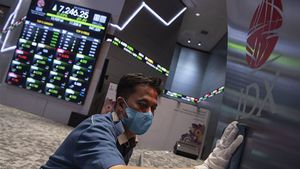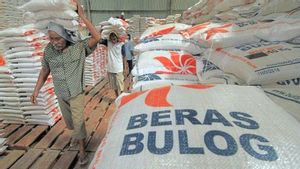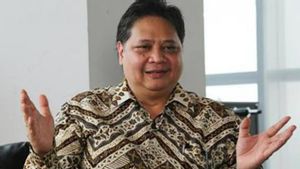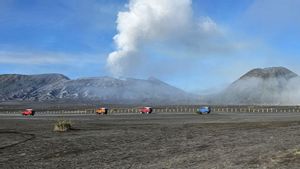Acting (Pj) Regional Secretary (Sekda) of West Java M Taufiq Budi Santoso said that the provincial government had prepared four investment-related strategies in West Java to improve economic performance in this region.
The reason, said Taufiq, West Java is one of the provinces with the highest economic growth rate and ranks first in investment realization in Indonesia for 2023.
"So there are four strategies to improve West Java's economic growth from the achievements in 2023," said Taufiq in a statement in Bandung, quoted from Antara, Friday, March 1.
The four strategies prepared by West Java, explained Taufiq, the first is to increase certainty and ease of licensing through increasing investment services.
Second, encouraging the development of downstream industries based on regional potential and leading sectors in West Java, such as agriculture, plantations, and fisheries.
Third, encourage inclusive investment through job creation and increasing the competitiveness of UMK through partnerships.
"And the fourth strategy, accelerating the implementation of the 'green economy' through the provision of facilities, convenience, and incentives for 'green investment'," said Taufiq.
These efforts, said Taufiq, were carried out as an effort to improve or at least maintain the economic performance in 2023 achieved by West Java by five percent and contribute 0.67 percent growth to the national economy.
West Java is also the province with the highest economic growth rate in terms of business fields, especially in the transportation and warehousing sectors by 10.93 percent and the highest economic growth rate in terms of expenditure in the import sector by 17.60 percent. As well as from investment realizations whose value reaches IDR 210.6 trillion in 2023.
In order to encourage economic growth, West Java focuses on improving infrastructure and increasing investment in four strategic areas in West Java that have been mandated in presidential regulations.
Namely Bodebekkarpur through Presidential Regulation Number 60 of 2020, and the Bandung Basin area which is mandated in Presidential Decree No. 45 of 2018. Two other strategic areas, namely the Tambourine area, and southern West Java which are covered by Presidential Decree No. 87 of 2021.
Along with the direction of the President of the Republic of Indonesia that economic growth in 2024 is targeted at 5.7 percent and the investment realization target in 2024 is IDR 1,650 trillion, Taufiq said West Java's investment target for 2024 is projected to increase in the range of IDR 247-250 trillion.
"Along with the focus of national investment policies, namely improving sustainable investment policies as well as services and competitive incentives, investment that provides added and oriented value to "green investment" as well as improving the quality of investment inclusively and equitablely. We hope that West Java's economic contribution to the national community will continue to improve in line with our increasingly complete infrastructure," said Taufiq.
Moreover, said Taufiq, several years earlier West Java was not like DKI and East Java, it did not yet have its own port and airport with a large enough capacity, and now there are Patimban Port and Kertajati Airport that have been operating again.
"This is an extraordinary potential that can fully increase West Java's economic growth," he said.
Taufiq also added that a number of National Strategic Projects (PSN) that were carried out in West Java also supported economic performance, such as the Cisumdawu Toll Road, bettersh high-speed trains, and others.
Not only that, but bureaucratic digitization also has a contribution to economic growth because the implementation of digital systems in government services can increase accountability and make it easier to access information and services.
Meanwhile, West Java Head of Bank Indonesia (BI) Representative Muhamad Nur said that with various developments, the West Java economy in 2024 is estimated to grow in the range of 4.7 percent - 5.5 percent (yoy). The inflation achievement in 2024 is predicted to be in the range of 2.5 percent or 1 percent (yoy).
SEE ALSO:
One of the recommendations to maintain economic performance in 2024 is to maintain and strengthen efforts to control inflation, especially food inflation, both "seasonal" and structural.
Efforts to control inflation "seasionally" include Cheap Market Operations (OP), Cheap Food Movement (GPM), Food Supply Stabilization and Prices (SPHP), as well as transportation cost subsidies.
Meanwhile, efforts to control structural inflation, such as expansion and optimization of cooperation between regions (KAD), strengthening and evaluating food stock data and reporting regularly in order to obtain Regional Incentive Funds (DID).
"In its implementation, we must coordinate with Badanas (National Food Agency) and Bulog," said Nur.
The English, Chinese, Japanese, Arabic, and French versions are automatically generated by the AI. So there may still be inaccuracies in translating, please always see Indonesian as our main language. (system supported by DigitalSiber.id)
















